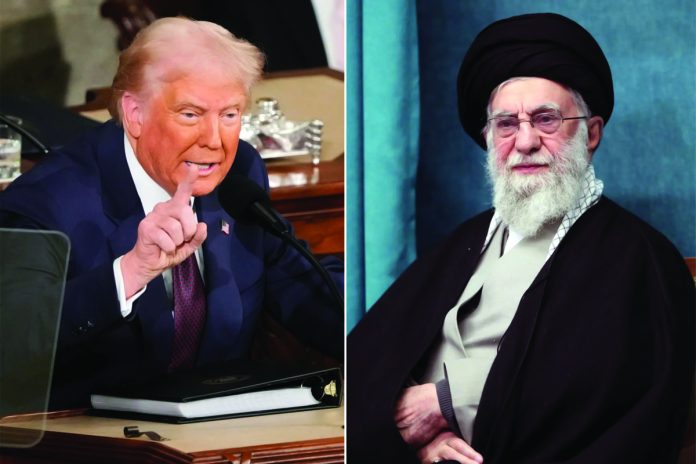Bismah Baig Mirza
President Trump’s latest move against Iran has once again stirred global anxieties. He issued a stern ultimatum demanding Tehran dismantle its nuclear ambitions within two months or face severe consequences. Trump’s aggressive posture has sent tremors through international diplomatic circles, highlighting his signature disregard for diplomatic subtleties and raising urgent questions about Russia’s potential reaction. The critical concern is whether Moscow will step in to defend its Iranian ally or retreat and risk isolation and the erosion of a crucial strategic partnership.
Trump’s direct communication with Iran’s Supreme Leader, Ayatollah Ali Khamenei, delivered through diplomatic channels via the United Arab Emirates, leaves no room for ambiguity. The message is starkly clear Washington demands a swift rollback of Iran’s nuclear program, hinting ominously that failure to comply would prompt the United States to pursue “other ways to resolve” the dispute. Tehran’s response has predictably been defiant yet carefully measured. While Ayatollah Khamenei dismissed Trump’s threats as deceitful and manipulative, Iran’s Foreign Minister Abbas Araqchi conceded that the message carries threats and potential diplomatic openings. Tehran thus stands at a critical juncture, weighing its response amidst mounting international pressure and regional tensions.
However, the most profound implications of Trump’s aggressive policy lie in Moscow’s reaction. Historically, Russia has positioned itself as a steadfast advocate of Tehran’s right to pursue peaceful nuclear energy, consistently urging dialogue over coercion. Dmitry Peskov, the Kremlin spokesperson, reaffirmed Moscow’s stance, cautioning against reckless escalation and underscoring the need for measured diplomatic approaches. Yet, beneath this public caution lies a troubling reality: Russia now faces a perilous strategic crossroads. By backing Tehran openly, Russia risks provoking American wrath, deepening its already troubling isolation amid heavy Western sanctions stemming from the Ukrainian conflict. Conversely, stepping back from its alliance with Iran would represent a strategic capitulation, jeopardizing Russia’s credibility and diminishing its influence in a geopolitically critical region.
Further complicating this precarious scenario is the volatile situation in Yemen, where Iran-backed Houthi rebels have intensified attacks targeting Western maritime routes in the strategically vital Red Sea. Washington directly blames Tehran for these provocations, leveraging the situation to justify decisive military actions, including targeted airstrikes on Houthi leadership and deploying additional naval assets to the region. Trump’s rapid military escalation underscores the lengths to which his administration is willing to go, unafraid of intensifying military pressure to achieve its strategic aims. Russia’s involvement with the Houthis reportedly through the provision of weapons and intelligence reinforces Moscow’s intricate geopolitical balancing act, simultaneously challenging U.S. interests while attempting to maintain strategic relevance in regional dynamics.
Yet, Russia’s path forward is fraught with peril. Continued alignment with Tehran amid escalating U.S. threats could lead Moscow to increased international isolation, imposing severe economic and diplomatic costs. Already battered by Western sanctions over Ukraine and strained by ongoing geopolitical tensions, the Russian economy might buckle under additional punitive measures stemming from support for Iran. Moreover, intensified military conflict in the Persian Gulf could significantly undermine Russia’s broader strategic objectives, drawing Moscow further into a destabilizing regional conflict it can ill afford. Nevertheless, abandoning Tehran would not be without profound consequences either. Russia risks damaging its credibility as a reliable ally, weakening its influence across the broader Middle Eastern landscape. Long central to Russia’s regional strategy, Iran provides Moscow with a crucial strategic foothold, counterbalancing Western influence and serving as a critical partner in Syria and beyond. Losing Iranian trust could severely curtail Russia’s geopolitical maneuverability, relegating Moscow to the margins of regional politics. Ultimately, the Trump administration’s provocative ultimatum has thrown Russia into an unwelcome dilemma, forcing a stark reassessment of its foreign policy calculus. The Kremlin must swiftly weigh the substantial risks of isolation against the equally damaging possibility of losing a vital strategic partner. Trump’s aggressive push against Iran not only threatens regional stability but also directly challenges Moscow’s capacity to navigate a complex geopolitical landscape.
The weeks ahead promise intense diplomatic maneuvering and strategic recalibrations in Moscow, Tehran, and Washington. Trump’s uncompromising stance places global stability at stake, forcing Russia into uncomfortable and potentially dangerous geopolitical decisions. As the deadline looms, the world watches anxiously to see how Moscow will navigate this latest American gamble a decision destined to shape Russia’s future and the very balance of power across the Middle East and beyond.
The author is the Executive Editor of the monthly Interaction.










